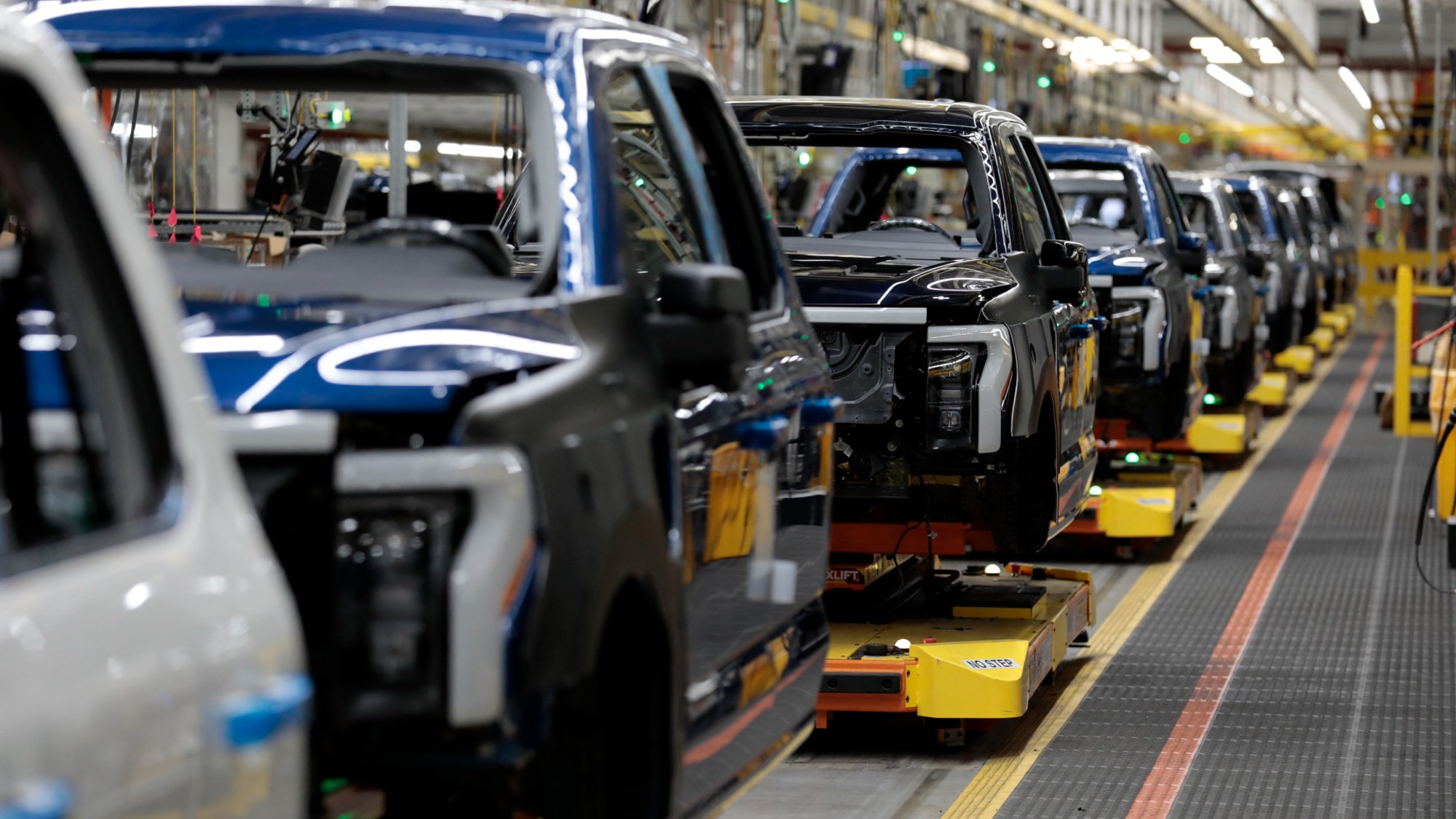The biggest tech layoffs of 2022
Amazon, Twitter, Meta, and more


A free daily email with the biggest news stories of the day – and the best features from TheWeek.com
You are now subscribed
Your newsletter sign-up was successful
Tech companies are dealing with the aftermath of the pandemic and marking the end of a decades-long industry-wide boom. "For the last 20 years, Silicon Valley has had the wind at its back thanks to rapid adoption of new technologies like the internet and smartphones," Timothy B. Lee explains for Slate. But now "the internet is maturing, and as a result, big tech companies don't have the same growth potential today that they did in 2012 or 2002. Investors, recognizing that, are increasingly demanding that tech companies focus on profits rather than growth."
As a result, many major tech companies are announcing layoffs and hiring freezes. Here are the biggest layoffs this season:
Amazon
Amazon is expected to cut 10,000 jobs in sweeping layoffs that will stretch into 2023. The layoffs would be the largest job cuts in the company's history, according to The New York Times. The web retail giant previously implemented a hiring freeze, citing an "unusual macro-economic environment."
The Week
Escape your echo chamber. Get the facts behind the news, plus analysis from multiple perspectives.

Sign up for The Week's Free Newsletters
From our morning news briefing to a weekly Good News Newsletter, get the best of The Week delivered directly to your inbox.
From our morning news briefing to a weekly Good News Newsletter, get the best of The Week delivered directly to your inbox.
Amazon's consumers "are feeling the sting of inflation," CNBC writes, leading to concerns about slowing growth. The company has closed a number of its in-person stores as well as limited its health-care service Amazon Care. Amazon's stock also took a hit last month after "the Seattle-based company predicted that the holiday sales period would be the slowest in its history," Bloomberg reports.
"Amazon will remain a powerhouse in retail and beyond," retail analyst Neil Saunders said in a statement to The Washington Post. "However, it will no longer find growth so easy."
Meta
Facebook, Instagram, and Whatsapp's parent company, Meta, is planning to lay off 13 percent of its staff, or over 11,000 employees. The company has also extended its hiring freeze through the first quarter of 2023. Facebook made a risky decision to invest in the metaverse, a "flop" that has cost the company $9.4 billion so far in 2022, per CNBC. Meta's expenses also increased 19 percent while sales dropped 4 percent.
Meta CEO Mark Zuckerberg took responsibility for the losses and apologized to the employees that would be impacted. He explained in a call to analysts that Meta would "focus [its] investments on a small number of high-priority growth areas."
A free daily email with the biggest news stories of the day – and the best features from TheWeek.com
After Elon Musk took control of Twitter, he immediately ousted many of its top executives. Just a short while later, he laid off approximately half of Twitter's workforce via email. Most recently, Musk reportedly laid off over 4,000 contract workers without giving them prior notice. The cuts came in many areas across the company, including content moderation and internal communications.
Musk purchased Twitter for $44 billion and has desperately sought a return on his investment. Musk claims the company has been losing $4 million per day, requiring him to make major job cuts. He has also sold billions worth of Tesla shares to pay Twitter's debt.
Lyft
Ride-sharing app Lyft announced a layoff of around 700 people at the beginning of November, citing a looming recession as the cause. However, the company actually only laid off 227 jobs.
Co-founders Logan Green and John Zimmer released a statement to their employees saying Lyft is "not immune to the realities of inflation and a slowing economy," and that the company was making cuts "to ensure [it] can ... stay focused on the best opportunities to drive profitable growth, and deliver strong business results in 2023 and beyond."
Snap
Social media app Snapchat's parent company Snap announced a layoff of 20 percent of its staff at the end of August. The company let go of over 1,200 people in a rather disorganized manner, including having employees meet with direct managers who read from a script, Insider reported.
Snap, like other tech companies, experienced a boom during the pandemic leading it to overhire. However, the company later faced major losses with its stock dropping by 80 percent and poor second-quarter earnings in 2022.
Stripe
Stripe, an online payment processing company, is laying off 14 percent of its staff. The company was reportedly the most valuable start-up in 2021, valued at $95 billion, but has since been reduced to $74 billion in value, reports The Wall Street Journal. It processes billions of dollars worth of transactions per year, competing with Paypal and Block.
CEO Patrick Collison released a memo in which he said the company "need[s] to match the pace of ... investments with the realities around us." He acknowledged that Stripe made "two very consequential mistakes" by being too optimistic about economic growth and growing operating costs too quickly.
Microsoft
Microsoft announced layoffs in multiple divisions of the company in October. While not confirming the exact number of job losses, sources say that it was around 1,000, Axios reports. This is the company's second round of layoffs in 2022, with a small number of workers being cut back in July.
The cuts reportedly were owed in part to fewer sales of Windows licenses for PCs this year. PC shipments also fell 13 percent in the third quarter of 2022 and overall growth has been the slowest in the last five years. "Like all companies, we evaluate our business priorities on a regular basis, and make structural adjustments accordingly," Microsoft told Axios.
Roku
Streaming platform Roku announced a layoff of 7 percent of its staff, amounting to 200 people. The company cited "current economic conditions" as the deciding factor, opting to cut expenses by 5 percent, reports Variety. The company also started reducing hiring at the end of the second quarter of 2022.
Roku's stocks plunged this year due to an impending recession cutting ad-spending budgets. It is also expected to have a revenue decline of 7.5 percent according to fourth-quarter predictions. "Taking these actions now will allow us to focus our investments on key strategic priorities to drive future growth and enhance our leadership position," Roku said in a statement.
DoorDash
Delivery service DoorDash is laying off 1,250 corporate employees, due to over-hiring as well as slowed growth. This follows a slowdown in hiring that the company announced earlier in 2022. DoorDash's value peaked in November 2021, but has since seen a slow fall, with shares down 60 percent this year.
In a statement, DoorDash CEO Tony Xu wrote that the company was "not immune to the external challenges and growth has tapered vs. our pandemic growth rates," adding that DoorDash has and "will continue to reduce our non-headcount operating expenses, but that alone wouldn't close the gap."
Update Nov. 30: This piece has been updated throughout to reflect the latest news regarding tech layoffs.
Devika Rao has worked as a staff writer at The Week since 2022, covering science, the environment, climate and business. She previously worked as a policy associate for a nonprofit organization advocating for environmental action from a business perspective.
-
 Corruption: The spy sheikh and the president
Corruption: The spy sheikh and the presidentFeature Trump is at the center of another scandal
-
 Putin’s shadow war
Putin’s shadow warFeature The Kremlin is waging a campaign of sabotage and subversion against Ukraine’s allies in the West
-
 Media: Why did Bezos gut ‘The Washington Post’?
Media: Why did Bezos gut ‘The Washington Post’?Feature Possibilities include to curry favor with Trump or to try to end financial losses
-
 Moltbook: the AI social media platform with no humans allowed
Moltbook: the AI social media platform with no humans allowedThe Explainer From ‘gripes’ about human programmers to creating new religions, the new AI-only network could bring us closer to the point of ‘singularity’
-
 What is Roomba’s legacy after iRobot bankruptcy?
What is Roomba’s legacy after iRobot bankruptcy?In the Spotlight Tariffs and cheaper rivals have displaced the innovative robot company
-
 Trump allies reportedly poised to buy TikTok
Trump allies reportedly poised to buy TikTokSpeed Read Under the deal, U.S. companies would own about 80% of the company
-
 How will Ford reinvent EV manufacturing to compete with China?
How will Ford reinvent EV manufacturing to compete with China?Today's Big Question Henry Ford's assembly line system is being replaced
-
 Is Apple breaking up with Google?
Is Apple breaking up with Google?Today's Big Question Google is the default search engine in the Safari browser. The emergence of artificial intelligence could change that.
-
 FTC bans fake online product reviews
FTC bans fake online product reviewsSpeed Read The agency will enforce fines of up to $51,744 per violation
-
 AI's boost for students and teachers in higher education
AI's boost for students and teachers in higher educationSpeed Read
-
 Artificial intelligence goes to school
Artificial intelligence goes to schoolSpeed Read AI is transforming education from grade school to grad school and making take-home essays obsolete
